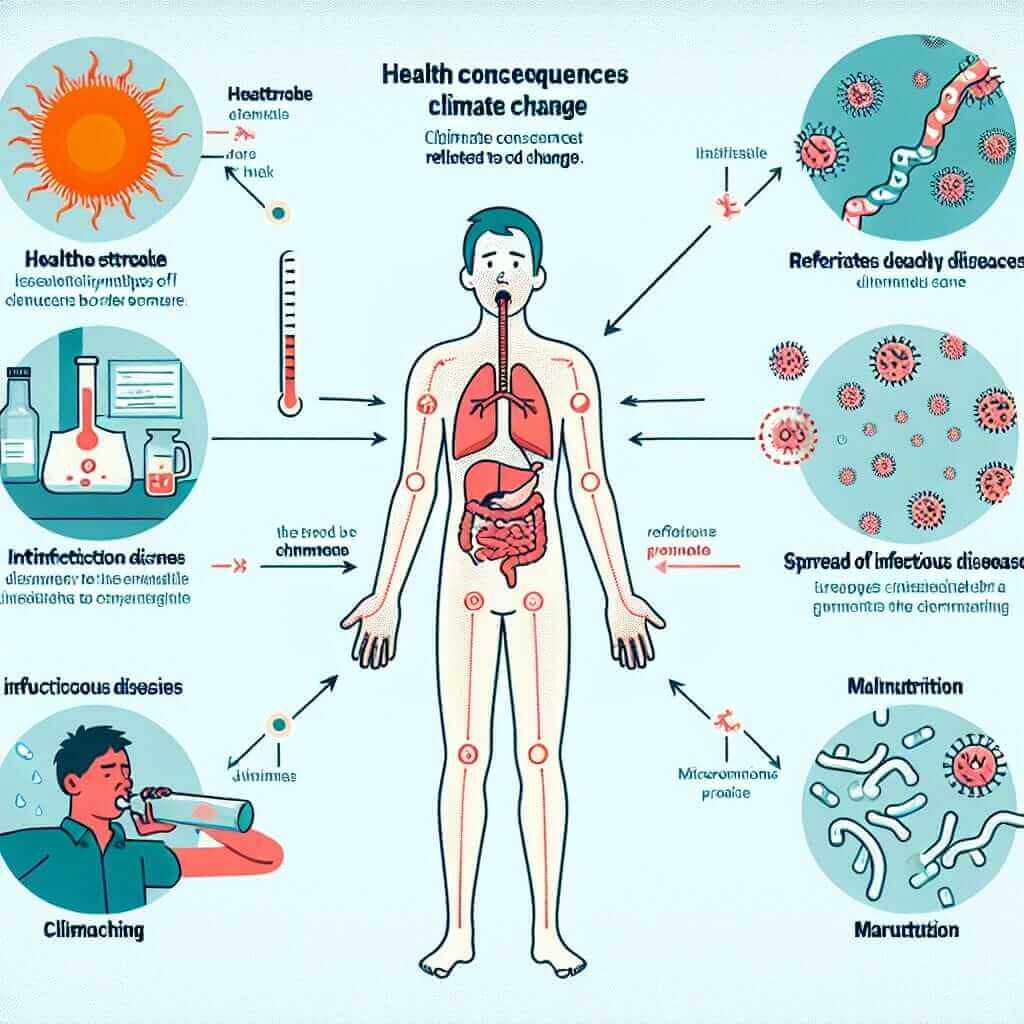The IELTS Reading section tests your ability to understand different types of texts, identify main ideas, locate specific information, and infer meanings. Given the increasing relevance of topics related to climate change and its implications, it’s highly likely that you may come across passages addressing environmental issues and their broader effects, including on global health.
In this post, we will explore the topic “How does climate change influence global health?” by providing a detailed IELTS Reading practice passage, questions, vocabulary, grammar points, and valuable tips. This practice will help you gain a deeper understanding of both the subject matter and the skills needed to excel in the IELTS Reading test.
Based on existing data and the historical prevalence of similar topics, environmental subjects, especially climate change and its impacts, are frequently tested and are expected to appear in future exams.
Practice IELTS Reading Passage
Reading Passage: Climate Change and Global Health
Climate change is becoming an increasingly critical issue impacting various aspects of human health across the globe. As global temperatures rise, the frequency and intensity of extreme weather events such as heatwaves, storms, and floods also increase, leading to both direct and indirect health effects.
One major consequence of climate change is the increase in heat-related illnesses and deaths. For example, heatwaves can exacerbate pre-existing cardiovascular and respiratory conditions. The 2003 European heatwave resulted in an estimated 70,000 excess deaths. Additionally, higher temperatures can lead to the proliferation of vector-borne diseases such as malaria and dengue fever, as the mosquitoes that transmit these diseases thrive in warm and humid conditions.

Moreover, climate change has a significant impact on air quality and, subsequently, respiratory health. Rising temperatures can increase ground-level ozone concentrations, contributing to respiratory problems like asthma and chronic obstructive pulmonary disease (COPD). Furthermore, wildfires, which are becoming more frequent and severe due to climate change, release particulate matter that can penetrate deep into the lungs, causing respiratory and cardiovascular issues.
Water-related diseases are also on the rise due to climate change. Floods and extreme precipitation events can contaminate water supplies with pathogens, leading to outbreaks of diseases such as cholera and leptospirosis. In areas experiencing drought, the scarcity of clean water can further magnify these health risks.
Food security is another area profoundly affected by climate change. Changes in temperature, precipitation patterns, and increased frequency of extreme weather events can disrupt agricultural production, leading to food shortages and malnutrition. This, in turn, adversely affects the health of vulnerable populations, especially in developing countries.
In conclusion, the repercussions of climate change on global health are far-reaching and multifaceted. Addressing these challenges requires comprehensive strategies that include public health interventions, climate mitigation efforts, and global cooperation to reduce the burden of disease and protect health outcomes.
Question Types and Tasks
Questions
Multiple Choice (MCQ)
-
According to the passage, which of the following is a direct consequence of heatwaves?
- A. Increased food security
- B. Enhanced biodiversity
- C. Aggravation of respiratory conditions
- D. Better air quality
-
What is the primary reason for the rise in vector-borne diseases?
- A. Increased ground-level ozone
- B. Proliferation of wildfires
- C. Warmer and more humid conditions
- D. Increased water contamination
Identifying Information (True/False/Not Given)
- The 2003 European heatwave led to an estimated 70,000 deaths.
- Rising temperatures can decrease ground-level ozone concentrations.
- Cholera outbreaks are more frequent in areas experiencing drought.
Matching Information
- Match the following health impacts with the respective cause mentioned in the passage:
- A. Malnutrition
- B. Respiratory issues
- C. Waterborne diseases
- i. Floods and extreme precipitation
- ii. Agricultural disruption
- iii. Increased ground-level ozone
Answer Key and Explanations
- C. Aggravation of respiratory conditions – The passage explicitly mentions that heatwaves can exacerbate cardiovascular and respiratory conditions.
- C. Warmer and more humid conditions – The passage explains that vector-borne diseases like malaria and dengue fever proliferate in warm and humid conditions.
- True – The passage states that the 2003 European heatwave resulted in approximately 70,000 excess deaths.
- False – The passage states that rising temperatures can increase ground-level ozone concentrations, not decrease them.
- Not Given – The passage does not provide specific information about cholera outbreaks being more frequent in drought-affected areas.
-
- A-ii – Malnutrition is linked to agricultural disruption due to climate change.
- B-iii – Respiratory issues are linked to increased ground-level ozone.
- C-i – Waterborne diseases are linked to floods and extreme precipitation events.
Common Mistakes and Tips
Common Mistakes
- Failing to locate specific details within the passage.
- Misinterpreting questions and answer options.
- Overlooking keywords that guide the correct answers.
Vocabulary and Grammar Focus
Vocabulary
- Proliferation (n.) /prəˌlɪfəˈreɪʃən/ – Rapid increase in numbers.
- Exacerbate (v.) /ɪɡˈzæsərˌbeɪt/ – Make a problem, injury, or negative feeling worse.
- Cardiovascular (adj.) /ˌkɑr·di·oʊˈvæs·kjə·lər/ – Related to the heart and blood vessels.
- Pathogen (n.) /ˈpæθədʒən/ – A bacterium, virus, or other microorganism that causes disease.
Grammar
- Relative Clauses – Used to provide additional information about a noun. Example: “Wildfires, which are becoming more frequent, release particulate matter.”
- Passive Voice – Often used in scientific texts to emphasize the action rather than the subject. Example: “The 2003 European heatwave resulted in an estimated 70,000 excess deaths.”
Advice for High IELTS Reading Scores
- Practice Regularly: Consistent practice with various reading passages can enhance your speed and accuracy.
- Skim and Scan: Develop skills to quickly locate key information and understand the gist of passages.
- Improve Vocabulary: Enhance your understanding of academic and topic-specific vocabulary.
- Time Management: Allocate appropriate time to each section and avoid spending too long on one question.
In conclusion, preparing for the IELTS Reading section involves understanding the format, practicing different question types, and staying informed about common topics like climate change’s impact on global health. Stay diligent and persistent in your practice, and you’re sure to see an improvement in your reading performance.